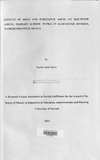| dc.description.abstract | The purpose of this study was to establish the effects of drug abuse on discipline among primary school pupils in Kamukunji division of Nairobi province. Three research questions and objectives were formulated to guide the study. The target population of the study was all the teachers and pupils in the 17 schools of Kamkunji division, Nairobi province. Purposive sampling, Random sampling and stratified sampling were used in the study. The sample was 181 teachers and 375 pupils. The study employed descriptive survey research design. The research instruments included the questionnaire, focus group discussions and interviews to solicit information from the respondents. Data from the questionnaires were analysed by use of SPSS programme while that from the focus group and interviews were analysed according to the themes in the study variables.
The study findings showed that, pupils had a general knowledge about drugs. Some had information from the school subjects while others had known such drugs from the community. They had seen most of the common drugs like alcohol, tobacco, narcotics, hallucinogens, inhalants, stimulants, mescaline and miraa. Pupils had abused drugs ranging from tobacco, miraa and alcohol to hard drugs such as narcotics, hallucinogens, inhalants, stimulants and also mescaline. It was further revealed that there were many factors attributed to drug abuse among pupils.
These factors included peer pressure, poor parenting, availability of drugs, parental involvement and lack of guidance and counseling. The communities where the pupils came from influenced them into taking drugs. This was because most pupils came from slum areas where drug peddling, selling and trafficking was prevalent. The findings also showed that drug and substance abuse were responsible for discipline problems in the schools. Pupils involved in drugs caused discipline problems such as truancy, bullying and fighting, indecent language, rudeness to teachers, disrespect to other pupils and teachers.
In the light of the research findings the researcher wishes to make the following recommendations on ways of curbing drugs and substance abuse. To begin with, pupils should be provided with adequate information on the negative effects of drug and substance abuse. This can be done within the family, in schools and also through various mass media adverts like televisions, concerts, movies and magazine. Secondly, principals, parents and teachers should exert a significant influence on pupil's attitude, knowledge and opinion on the effects of drugs and substance abuse.
They can compliment a school's drug programme by incorporating drug abuse prevention strategies into their subject at any level of grade. Third, the government should effectively and vigorously enforce laws governing sales of alcohol and tobacco to minors, including using underage youth to buy alcohol and tobacco products in 'sting' operations. In addition, the governments should ensure that there are warning on the effects of the use of certain drugs and substance. Fourth, moral guidance should be provided to the youth through involvement in church activities and community work during their leisure time while at home. Lastly, the government should also strengthen police inspections at the border crossing points such as the seas, lakes and the airports. Inspection is likely to help prevent smuggling of the drugs in to the country. | en_US |

